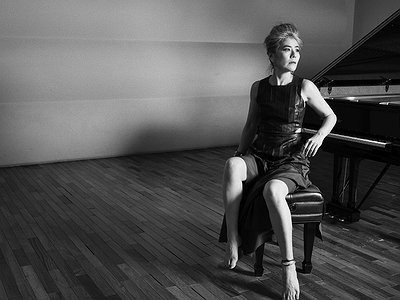Name: Tomoko Mukaiyama
Nationality: Dutch-Japanese
Occupation: Pianist, visual artist, director
Current release: Tomoko Mukaiyama La Mode is out now on her own Tomoko imprint.
Recommendations: Salo or the 120 Days of Sodom, film by Paolo Pasolini; Misaki, a novel by Kenji Nakagami
If you enjoyed this interview with Tomoko Mukaiyama , visit her personal website for more information on her and her work.
When did you start playing your instrument, and what or who were your early passions and influences? What was it about music and/or sound that drew you to it?
I don't have a good answer. I was forced to learn piano by my mother, did not like it until I graduated college.
For most artists, originality is preceded by a phase of learning and, often, emulating others. What was this like for you: How would you describe your own development as an artist and the transition towards your own voice?
Crossing the border of other disciplines has been the way to create my language. Last year I have been making films. This gives me a new perspective on the music.
How do you feel your sense of identity influences your creativity?
Origin = femininity
What were some of your main challenges when starting out as an artist and in which way have they changed over the years?
To create the right team with people who are seeing same goal.
As creative goals and technical abilities change, so does the need for different tools of expression. Can you describe this path for you, starting from your first instrument?
Concept and technique often move in parallel with me. And technique is not necessary provided by artists.
Tell me about your instrument, please. How would you describe the relationship with it? What are its most important qualities and how do they influence the musical results, including your own performance?
I see my body as my main instrument before I speak about the piano.
How would you describe your approach to interpretation? Where do you start and how do you develop your view on a piece, what are some of your principles and what constitutes a successful interpretation for you?
I approach the work from image and sound at same time. The visual concept can help the development of an idea for a musical piece.
Collaborations can take on many forms. What role do they play in your approach and what are your preferred ways of engaging with other creatives?
Sometimes I am myself a good collaborator. At other times, I bring conflicts as well between sound and image.
Take us through a day in your life, from a possible morning routine through to your work, please. Do you have a fixed schedule? How do music and other aspects of your life feed back into each other - do you separate them or instead try to make them blend seamlessly?
It might not be very interesting about my routine. Normally I am working a whole day from the moment I am awake - and sometimes I take my work to my bed.
Can you talk about a breakthrough work, event or performance in your career? Why does it feel special to you? When, why and how did you start working on it, what were some of the motivations and ideas behind it?
‘For you’’ is conceptually my stronges work. It is a normal piano concert series except there are two significant differences:
- The concert lasts only 20min.
- There is only one audience member per concert.
This concept was challenging the ideas what a concert is.
There are many descriptions of the ideal state of mind for being creative. What is it like for you? What supports this ideal state of mind and what are distractions? Are there strategies to enter into this state more easily?
I don't need to enter different state of mind, I am continuously creating –with the media and materials I have.
Music and sounds can heal, but they can also hurt. Do you personally have experiences with either or both of these? Where do you personally see the biggest need and potential for music as a tool for healing?
I would rather present music which confronts the listeners. That eventually leads to healing.
Our sense of hearing shares intriguing connections to other senses. From your experience, what are some of the most inspiring overlaps between different senses - and what do they tell us about the way our senses work? What happens to sound at its outermost borders?
Some years ago I created a concert in the space with composed (time wise, too) scent. This field can be explored more in the future.
Art can be a purpose in its own right, but it can also directly feed back into everyday life, take on a social and political role and lead to more engagement. Can you describe your approach to art and being an artist?
We are living in a time where we have more responsibilities than ever for equality, human rights, our children, the environment, our planet and more.
So I can not imagine artists/art without engagement on society and politics.
What can music express about life and death which words alone may not?
I think words alone may not express anything about life and death – neither can music alone for that matter.




